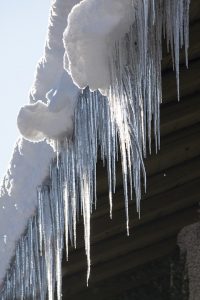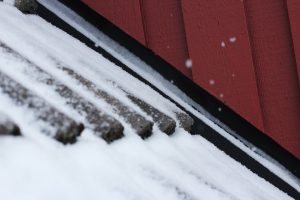How the Weather in Colorado Affects Your Roof
Four Weather Events that Affect Your Roof’s Life Span
Roofing in Colorado is different than roofing elsewhere. The altitude in Denver and the various weather patterns throughout the State require particular considerations for your roof to withstand the climate. In this post, we will help you to understand how the weather events in Colorado affect your roofing structure.
Altitude
Whether you live in the city or in the mountains, altitude affects your roofing structure. The air pressure, solar radiation, density and oxygen, temperature and atmospheric water vapor augment in high altitudes; and all these factors help to cause wear and tear on your roof. Routine roof maintenance and gutter cleaning will help you to extend the life span of your roof in higher altitudes.
Ice Dam Formation
 Ice dams are lumps of ice that form at the edge of a roof under certain wintertime conditions. When this happens, melting snow water cannot run off the roof and ends up backing up under the shingles and drip through the roof into your house. Other things that contribute to ice dam formation include poor roofing ventilation and under-insulated attics. Colorado is well-known for having warm days followed by freezing nights, and this cycle adds to the size of the ice dam formations. So, it is important to hire professional roofers in Colorado to ensure that high-quality materials are used and that your roof is properly installed.
Ice dams are lumps of ice that form at the edge of a roof under certain wintertime conditions. When this happens, melting snow water cannot run off the roof and ends up backing up under the shingles and drip through the roof into your house. Other things that contribute to ice dam formation include poor roofing ventilation and under-insulated attics. Colorado is well-known for having warm days followed by freezing nights, and this cycle adds to the size of the ice dam formations. So, it is important to hire professional roofers in Colorado to ensure that high-quality materials are used and that your roof is properly installed.
Snow
Snow affects roofs differently based on insulation, pitch, slope, and ventilation. These characteristics are directly related to how well, and how long your roof can successfully maintain its structural integrity.
 A roof that is correctly insulated and ventilated and properly installed with a higher pitch will normally be more durable than a roof with a lower pitch. If the snow accumulation on your roof becomes excessive, we highly suggest having the snow removed.
A roof that is correctly insulated and ventilated and properly installed with a higher pitch will normally be more durable than a roof with a lower pitch. If the snow accumulation on your roof becomes excessive, we highly suggest having the snow removed.
Cracked walls, interior doors popping open, loud cracking or popping noises, major leaks, and sagging ceiling joists are signs of damage that should be immediately attended.
Sun Exposure
Over time, direct heat exposure and UV radiation will wear down many materials. Three-hundred days of sunshine in Colorado plus the increased altitude in some areas can damage roofing materials faster than the same exposure at a lower altitude. Shingles will become weak, losing their protective qualities, and even decoloring, making your roof look old beyond its years.
By performing regular roof inspections to your roof or evaluating whether a major storm caused any damage, you will help the maintain performance of your roofing materials and prolong the life and integrity of your roof.
Thanks to our 25 years of service in Colorado, Horn Brothers Roofing understands local weather patterns and how they affect your roof. We use this knowledge to protect our customers with roofs that will last for years. Call us at (303) 274-1111 if you need a roof inspection in Colorado.



You must be logged in to post a comment.